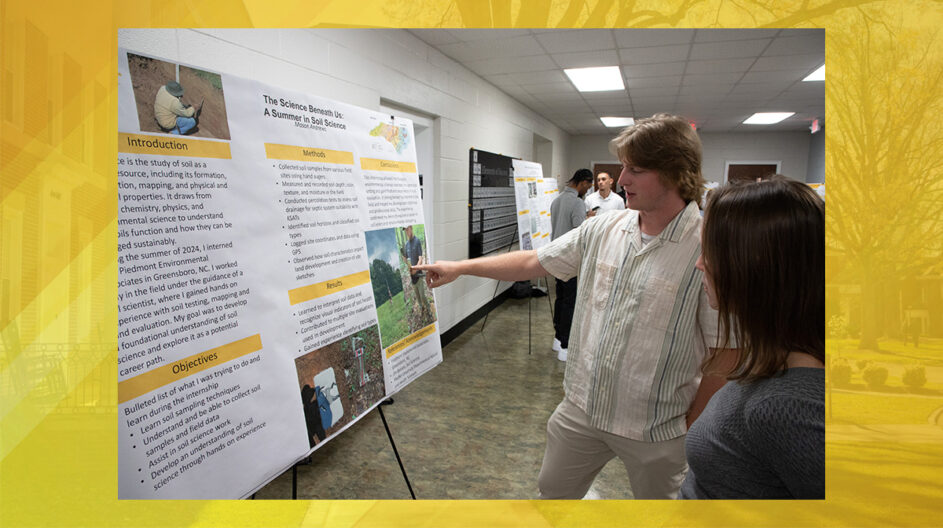
Symposium Showcases Students’ Research
During his senior year at Pfeiffer University, where he majored in Biology, Joshua Hartsell ’23 became a Milton Rose Scholar who conducted independent research on alterations in dopaminergic genes caused by nicotine consumption. He displayed a poster summarizing his findings on campus at the George Pfeiffer Research Symposium, an annual event that showcases the innovative research being conducted by Pfeiffer’s undergraduate science students in collaboration with faculty mentors.
Hartsell is now pursuing a doctorate in biochemistry at N.C. State University. On April 11, he participated in the symposium again — this time as the keynote speaker for the event, which took place in the Harris Science Building, where undergrad symposium participants also stood by displays of their posters and discussed their work with guests.
“It felt really good to go back to the college that I went to for my undergrad and be able to give a keynote address,” Hartsell said. “Hopefully, my talk drove home the idea that the research you do at Pfeiffer and the education that you receive there can lead to grad school, where you will be well prepared to do more advanced research.”
Hartsell hopes to work in pharmaceutical research and development after completing his doctorate. His keynote address, titled “Investigating the Role of Metformin in Fructose Metabolism,” underscored the great progress he continues to make as a researcher at the graduate level. It illuminated the beginning steps of his dissertation research, which is looking at how the drug metformin alters fructose metabolism in the intestine to protect the liver from fat accumulation under a high fructose diet. Metformin has been around for many years as a widely prescribed treatment for Type 2 diabetes; in recent years, though, researchers have begun examining the drug’s potential effects on other medical conditions.
Dr. Laura Reichenberg, an Associate Professor of Biology at Pfeiffer, chairs its Department of Natural and Health Sciencesand runs the symposium. She said that Hartsell’s participation in this year’s symposium was “especially meaningful.”
“It underscores the long-term impact of this program and the ways in which it helps shape future careers in science and research,” she said.
The symposium is also a great way to showcase the work of current Milton Rose Scholars: Of the 16 students who participated in this year’s symposium, seven were part of the Milton Rose program, which Reichenberg lauded for giving its participants “invaluable hands-on experience” in the research space.
“They also learn how to synthesize and communicate their findings effectively through poster presentations, developing both technical and professional skills,” she added.
Mary Beth Bowers ’25, a biology major and a Milton Rose Scholar who participated in the 2025 symposium, would agree. Her research project investigated the impact of different dog foods on gut bacteria, with the aim of determining which type of food benefits canine health the most. She did this by employing molecular and microbiological techniques on stool samples from dogs. She plans to apply to veterinary school and believes her research experience will enhance her application.
Bowers lauded the Milton Rose program for teaching her how to make effective posters (with, for example, concise wording and effective color schemes) and for giving her the confidence to talk about her research “without strictly having to read it off the page.” And she said that she had refined certain lab techniques simply because she was required to do them more: “You do learn these techniques in class, but you only get to do it once or twice in the lab and then you move on to the next topic. But for me, I’ve been able to do them several times and really get the hang of these things.”
Josh Turner ’25, a Health and Exercise Science major and a Milton Rose Scholar, is equally bullish on the Milton Rose program. At this year’s symposium, he displayed a poster that aimed to “preview” the Honors Program thesis that he was scheduled to defend before graduating in May. He described his research as a “literature review” of several papers documenting exercise’s positive effects on mitigating the symptoms of Long COVID. The symptoms include fatigue, brain fog, chest pain, muscle weakness, and respiratory insufficiency.
Turner’s thesis work suggests that even simple exercises, like increasing daily step counts or beginning some sort of strength training, can have significant benefits for those with Long COVID, just as it does for people diagnosed with chronic fatigue syndrome and with neurodegenerative and neuromuscular diseases. His work places emphasis on exercise interventions in neuromuscular conditions.
“We don’t yet know what role exercise specifically plays in combating Long COVID, but we’re thinking it can be a really substantial one,” he said. “We can do something for our bodies in the realm of exercise to help offset what we call the total symptom severity of this condition.”
Turner expressed gratitude for the opportunities that the Honors and Milton Rose programs have afforded him.
They “caused me to grow a lot as a student,” he said. “I’m not pigeonholed into one singular topic. I can actually do things and explore material that I have a lot of passion about with professors who know a lot more than I do.”